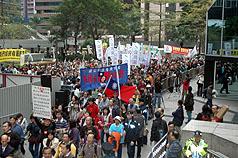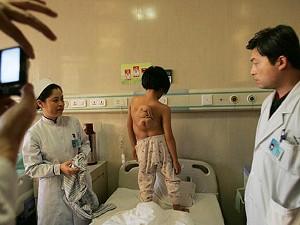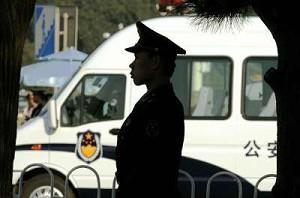HONG KONG—The Standing Committee of the National People’s Congress (NPC) in China decided by vote that Hong Kong will not implement universal suffrage - the election of the Chief Executive of Hong Kong and all members of the Legislative Council—in 2012.
On December 29, the NPC Standing Committee passed a resolution steering the future development of Hong Kong’s political system. The resolution says that in 2012 there will be no universal suffrage and the ratio of seats from direct election and functional constituency will not change. The legislation instead said that there may be a general election for Chief Executive by 2017, where the Legislative Council election may then have universal suffrage for all councilors. The suffrage date is not set in stone as the resolution claims that universal suffrage needs to develop “gradually and orderly.”
Pro-democratic parties and organizations within the territory issued a joint statement expressing disappointment and anger at this decision. In the statement the pro-democracy advocates strongly protest that the rejection of 2012 universal suffrage is against the will of most Hong Kong people.
The statement points out that ruling out changes in the ratio of seats and the way of voting for the 2012 Legislative Council goes against the principle of making gradual and orderly progress.
The statement also makes clear that the majority of Hong Kong residents have demanded general elections by 2012. The NPC’s decision goes against these wishes and it does not give any details about the election. Pro-democracy advocates worry that this legislation suggests that there will be no universal suffrage even 20 years after Hong Kong’s return from British control. It calls upon the Hong Kong people to unite for 2012 general elections.
“The NPC resolution is trampling people’s demand for democracy,” said Democratic Party Chairman Albert Ho Chun Yan. who points out that although the resolution mentioned universal suffrage could take place in 2017, it is not a promise.
“If by that time the Beijing authorities still feel the situation unfit, they can again order pro-communist legislators such as those in the Liberal Party and the Democratic Alliance for the Betterment and Progress of Hong Kong (DAB) to vote against it. Hence, if there is no reasonable arrangement for universal suffrage for Hong Kong’s Chief Executive, a general election is merely an empty promise.”
Legislative Councilor Audrey Eu Yuet-mee, a member of the Citizens’ Party, also has trouble with the NPC’s decision. In fact, she believes that no change in the seat ratio between direct-election and functional constituency in 2012 Legislative Council election violates the Basic Law’s principle of gradual and orderly progress in achieving universal suffrage.
On the afternoon of December 29, over 1,000 of Hong Kong’s pro-democracy advocates gathered outside the Hong Kong Legislative Council to protest the NPC resolution, and later marched through the streets of Hong Kong demanding universal suffrage. They paraded to the conference and exhibition center where the political development forum was held, and protested to the deputy secretary-general of the Standing Committee Qiao Xiaoyang.
Petitioners said that the NPC Standing Committee’s resolution to reject the suffrage was a black box operation.



